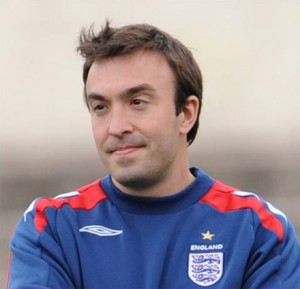
Dan Abrahams is a highly qualified, passionate and successful sport and football psychology consultant who makes an impact and gets results.
Examples of his work to date includes helping Carlton Cole go from forgotten West Ham reserve team player to England International in just 18 months and helping Anthony Stokes go from scoring just 4 goals in a season to 20 goals in 5 months. This resurrected his career and earned him a million pound move to Celtic.
His work also involves helping young kids break into the first team for example, Junior Stanislas at West Ham, helping players move up in leagues (Richard Keogh from Carlisle to Coventry) and helping players move from non-league clubs to league clubs (Shaun Batt from Fisher Athletic to Millwall) just to name a few.
Having played golf professionally he understands the challenges faced in high performance environments. He holds a first class honours degree in psychology and Masters degree in sports psychology.
Dan has worked in the football industry for many years and is quickly becoming a leader in the field of football psychology. He has presented at over a dozen league clubs, to the English Football association, the British Professional Footballers’ Association, the English League Managers Association, the League Football Education and the League Football Trust.
He has been a guest speaker at the Football and Science Conference in London, the Grassroots show in Manchester and the World Science and Soccer Congress in Belgium.
He has also been invited to the Soccer Mastermind family, which he happily accepted with the following interview.
Dan has thousands of followers on Twitter and his goal is to help as many footballers, coaches, managers and parents of players with his simple psychology techniques.
Please put your hands together for Dan.
Gather around and listen up soccer parents.
1/ The Carlton Cole story must be very satisfying. When you worked with him, Anthony Stokes, Junior and Richard Keogh did they all show the same symptoms? Was there a common symptom or issue and what was the cause?
They all had different challenges. Every client brings different challenges to the table just as they all bring different personalities, expectations, wants, needs, fears, hopes, doubts, beliefs. Treating everyone the same is a no, no.
2/ By the way, your twitter quotes are fantastic (@DanAbrahams77)
Two that stand out for me are
“Confidence is a consequence of preparation and mindset”
“A footballer must keep his mind in the present moment”
Could you elaborate a little for my readers?
A confident mindset is a result of being thoroughly prepared combined with an ability to manage performance focus and performance thinking on the pitch. You can be prepared but if you focus incorrectly or think destructively it’s likely you’ll play poorly.
Present moment thinking relates to keeping your mind firmly in the now..the very second you are playing. Players tend to dwell on the past (e.g. thinking about a mistake they made) or project themselves to the future (e.g. how long there is to go.) Keeping your mind in the present moment allows a soccer player to play with freedom and precision. You won’t ‘play tight’ when you’re in the present moment because there is nothing to tighten you up.
3/ For all the young players, what advice would you give them for dealing with negative thoughts?
The simplest idea is to focus on keeping great body language as you play. Keep your head up and stay on your toes (alert, alive and energized.) When you do this you enable your body to silence that negative voice inside your mind. A coach and parent should communicate this to a young soccer player “keep looking confident all the time. When you make a mistake stay lively and on your toes.”
4/Do you believe in potential? Should young children be branded as having potential?
I believe in ‘potential’ in that everyone has the potential to become better and better at soccer…no matter what their age. This doesn’t mean that we can all be Lionel Messi or Wayne Rooney but it does mean we have to be open minded about how good we can be. No one knows anyone else’s playing ceiling (how good they can be.) We are all just guessing. So carry on training and work as hard as you can to be the very best soccer player you can be. If it’s good enough to play in the Premier league then great. If it’s good enough to play park soccer then so be it…as long as you love playing the game.
5/ In my post “Youth Soccer, Sugar Coating and the Self Esteem”, I talk about praising effort as opposed to winning or an outcome. Do you agree?
To say I agree would be an understatement. Praising effort sustains effort. It ignites a passion to learn and improve. It keeps players persisting through tough times.
6/Can you give my readers the easiest way to overcome the fear of failure?
Have fun and keep your mind firmly in the present moment.
7/Many would argue the atmosphere around kids soccer has changed over the years. Why do you think so many children quit the game before they become teenagers?
Because of the win/lose culture prevalent in youth soccer (this is slowly changing) or because mum and dad think their son/daughter is going to be the next David Beckahm or Mia Hamm.
8/ How can youth players’ prepare/ train themselves mentally to maintain 90 minutes focus where they must go in and out of the “zone”?
Practice when you practice. During training learn to relax when the ball is out of play then engage when it’s in play. SPOT if you relax too much while the ball is in play…learn to build awareness of your mindset while you train.
9/ What are the key focus points in dealing with failure?
Learn to talk to yourself better. After a poor game ask yourself “what went well?” And the “What do I need to do better next time?” Good questions like this puts the performance in perspective and gets you focusing on improving things
10/ How can a child play like it doesn’t matter when it matters the most?
This is a real challenge and one that can never be mastered. It’s just about having the same pre match routine that helps you get the balance between focus and freedom and about recognizing that it’s just a game and there to be enjoyed – have fun. The 3 F’s must be adhered to – focus, freedom and fun.
11/ ” In what order would you place the following as important (psychologically) in making a good player a great player…
* Practices relaxation, imagery and self hypnosis before contests 11th
* Able to set high motivation to win 6th
* Displays confidence 2nd
* Is coachable 1st
* Is conscientiousness with determination to succeed 4th
* Is slightly extroverted personally, midly anxious 10th
* Incentive to achieve excellence 3rd
* Success is a by-product of performance, likes stressful situations, is aggressive with assertiveness 5th
* Is less intense, less depressed, less angry, less fatigued, less confused 8th
* Shows high mental energy 7th
* Able to process information, not overloaded and has high self-esteem 9th
12/ What would you say to a child that’s just played a shocker?
“What went well?”
13/ What are your thoughts about parents coaching from the sidelines?
Don’t…stop!
14/ Do you still swing the clubs (Golf)? If so, can you predict when you’re going to have a stellar round as opposed to a stinker based on your mindset and the way you’re feeling? Must be confusion trying to abuse the ball, control the body language and maintain concentration and focus.
My rounds are always stellar…just not always with a great score 😉
15/ What does the future hold for Dan?
Ha! My goals list is secret
If you like what Dan has to say you can follow him on twitter at @DanAbrahams or at his website Dan Abraham-Sports and Football Psychology Expert. Make sure to subscribe to his website and receive the first 4 chapters for free. Powerful stuff!
If you liked this interview, please share it on Facebook and Twitter. If you show the love, we might be able to persuade Dan to come back and answer a few more questions.
“May the winds of destiny blow you to the stars”



this is very important for young soccer player like us to know Wat to do and when to do something about our soccer career, i like it.
and i would also like to know if you are also involve in soccer management? because there is many young soccer player who don’t have soccer agent.